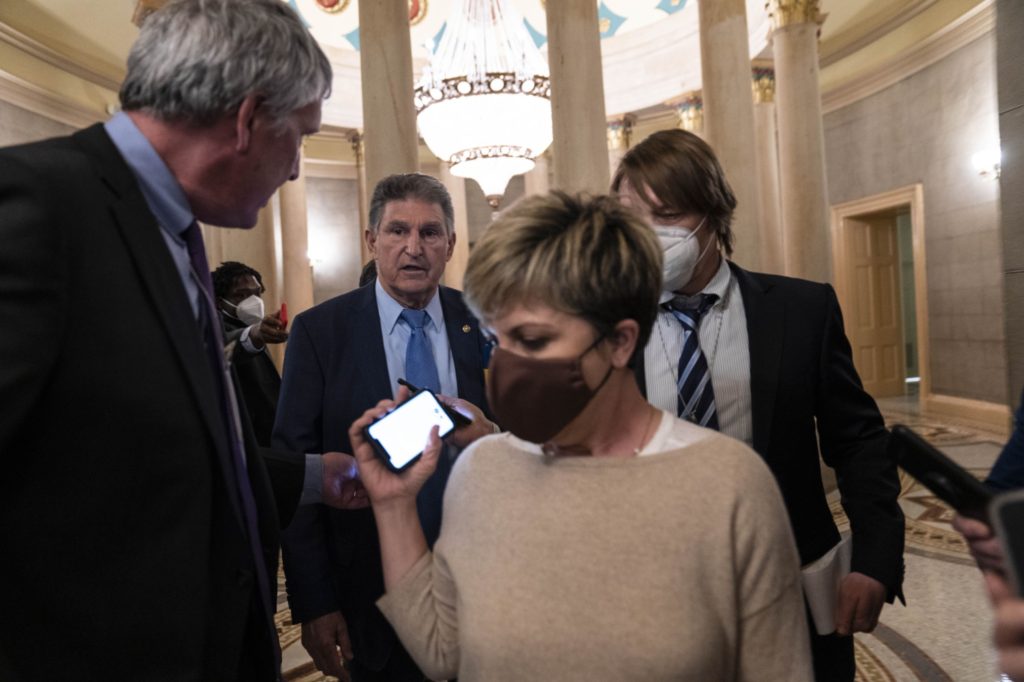Manchin outlines a path to revive Biden’s stalled economic agenda

Key Democratic Senator Joe Manchin laid out a path to reviving President Joe Biden’s economic agenda, saying he could support a slimmed-down version that splits any revenue raised between shrinking the deficit and new spending.
Manchin’s outline was welcomed by some fellow Democrats as a sign of a potential break in the stalemate over the package of climate initiatives and social programs that was originally designed to be the centerpiece of the party’s midterm election campaign.
His proposal includes partially rolling back the 2017 tax cuts by raising rates on upper-income Americans and corporations, with half the increased revenue going toward “fighting inflation or deficit reduction.”

Sarah Silbiger/Bloomberg
“The other half you can spend on a 10-year program, whatever you think is the highest priority,” the West Virginia senator, whose vote is pivotal in the 50-50 Senate, told reporters. “Right now it seems to be the environment, which is a rather costly one.”
Manchin’s plan would require progressives to abandon some key priorities, such as spending for child care and education that were in the $2 trillion package the House passed last year. House Progressive Caucus Chair Pramila Jayapal on Wednesday signaled she would settle for less than the House bill in order to move forward even though it would require tough choices about what programs to cut.
Manchin’s comments are a positive sign that Congress can get the Biden agenda “back on track now and we need to do that sooner rather than later,” the Washington Democrat said. “We have to get done what we can.”
Senate Finance Chair Ron Wyden said his three priorities are health care, clean energy and addressing tax avoidance, which could fit within the framework Manchin is proposing.
“Senator Manchin opened the door today to moving forward in that kind of way. I think it is positive,” Wyden said. “I’m encouraged by it, and we’re gonna pick up and go to work.”
But Manchin’s tax plan may run into trouble with Senator Kyrsten Sinema of Arizona, who has opposed repealing the Trump-era tax cuts. Manchin acknowledged Sinema’s reluctance to raise tax rates and did not dismiss outright the workaround in the House bill which imposes wealth based surtaxes and a minimum corporate tax.
Manchin said he hasn’t had formal talks with the White House but “they know where I stand.”
Democrats need 50 votes to pass any economic proposal in the Senate using the budget reconciliation process and Republicans are uniformly against Biden’s agenda. Manchin’s opposition stalled the House-passed version. Among other issues, he cited the impact of more government spending on accelerating inflation.
Politico first reported the news of Manchin’s counteroffer.
The White House has not directly engaged in talks with Manchin since September and instead has leaned on moderate senators like Mark Warner of Virginia to try to broker a compromise.
Biden during the speech laid out a version of the Build Back Better bill designed to appeal to Manchin and focused on health care costs. Provisions curbing prescription drug prices, bolstering Obamacare premiums and subsidized child care would be paired with tax breaks for climate change initiatives. Biden said he would continue to propose tax increases on the wealthy and corporations to pay for these initiatives while also reducing the budget deficit.
That plan “will grow the economy and lower costs for families. So what are we waiting for? Let’s get this done,” Biden said.
The pitch was largely the same one the White House has been making in the more than two months since the Biden plan known as Build Back Better stalled in the Senate.
Manchin balked at the House-passed version of the bill, which included items like an expansion of Medicare, paid family leave benefits and refundable child tax credit payments he had never signed off on. The House climate package would cost $500 billion. The tax and drug proposals in the House bill raise nearly $2 trillion.
Congress for the moment is focused on reacting to Russia’s invasion of Ukraine, finishing the delayed full-year government funding bill, and a confirmation vote in the Senate for Biden’s Supreme Court nominee.
— With assistance from Laura Davison


